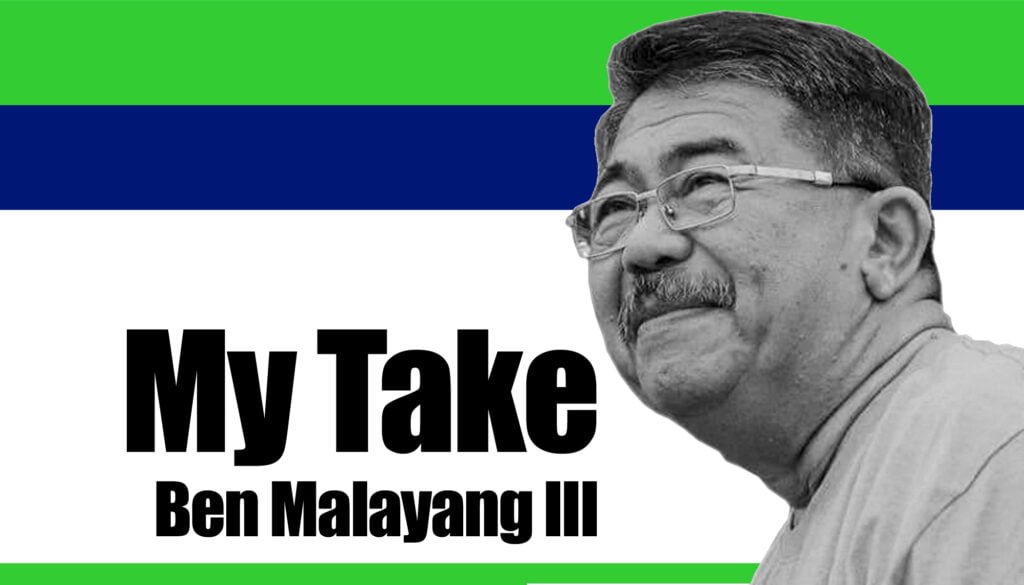
For as long as our Constitution stands on the principle of people being the Government, every qualified citizen has the responsibility to do their share of governance. At the minimum, it is to vote.
We have the liberty to choose to vote or not to vote. But if we rely on (and our families are affected by) how government meets many of our needs (like police and fire protection, roads and bridges, education, health services), it is our moral obligation to vote. Voting is owning a share of making our government well and a good.
Government may repeatedly fail our expectations. But giving up on government is like tiring in dousing a fire and so just leave it to burn down the house.
Registering to vote. The responsibility to vote is true in any country founded on the Constitutional principle of people being the government. Registering to vote is a civic responsibility regardless of your politics, or who you’ll vote or not vote. There could be times when for some reason we are not able to vote. But not registering and refusing one’s civic responsibility to vote is like refusing to participate in building up a good government whose services you need for yourself and your loved ones. It’d be a moral failure.
There are reasons for easily giving up on registering and voting: no time to do it; takes too long to do it; long lines in COMELEC offices; no sense in voting when my vote would only be one of many that it won’t make a difference; elections and politicians don’t matter to me and I don’t like them; too many of our voters are easily bought and there’s not much I could do about it; elections and government are untrustworthy.
Perhaps for these reasons – all valid, mind you – some 4 million young Filipinos (18-24 years old) did not register to vote in the 2016 presidential election. The votes for President Duterte might have been more than the 16 million he got that time. Or it could have been less. Or someone else would have been President. Whichever, the 4 million unregistered youth who didn’t vote may have made a difference on where and what our country is now.
September 30 is this year’s deadline to register. It’s less than 100 days away. It’d be a crucial “fork in the road” day for qualified but still unregistered voters to make a difference on where we’d be (and what we’d be) in the years ahead.
I recognize that the hassles of registering and the let downs we have had with elections and government discourage people from registering. But we line up in the sun to enroll in the schools the government provides, don’t we? We laboriously put together documents to avail of subsidies for medical services, for passports, and for licenses, don’t we? We grudgingly do these of course and complain each step of the way, but we do them because of the benefits we get in return, don’t we? The benefits of voting may seem nebulous, remote, far fetch, and frustrating. But at the end, they affect you. They either make you happy or lose opportunities to live better.
Registering to vote means these to me: (1) exercising a moral obligation and investing time and efforts to contribute to building a good government; (2) acquiring the moral right to avail of government services and demand government accountability for the sufficiency and quality of public services using our taxes; and (3) making yourself available to possibly serve people in the civic space. In short, it means acquiring the right to correct government (for its shortcomings) and support it (for its successes). It means having the right to change poorly performing people in government and keep those who are doing well.
Schools. If the business of education is to make better citizens, schools may need to push (perhaps even require) their qualified students to register to vote (or to show proof of being registered voters in the Philippines for Filipinos or in their own countries for foreign students). This could be grounded on the principle that it is a fundamental mandate of schools to make their students better citizens, have a good civics education, and build up their sense of civic duty to prepare them to serve others. We require students to show proofs of good moral standing and good physical health; why not include (when qualified) proof of being a registered voter as one indication of being a good citizen?
Faith institutions. Faith institutions may exhort the faithful to register and to vote, even if it hurts. We recall the pregnant Mary and the dutiful Joseph. They made the difficult trek from Galilee to Bethlehem to register for the census and fulfill their civic duty as citizens. It hurt but they did it anyway. And because they did, the Savior was born exactly where and how it was prophesied. Fathi Yusof et al. (2014) explains the concept of free and fair election in relation to Islamic constitutional and political principles of justice, equality, al-syura, al-khilafah, and others. These suggest that to vote is a moral and a spiritual obligation in both the Christian and Muslim faiths.
To register or not to register?
Your choice, actually. But also your consequences, eventually. – NWI




